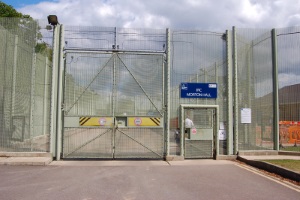Inspection report recommends that there should be a strict time limit on the length of immigration detention
HM Chief Inspector of Prisons last month released a report following an unannounced inspection of Colnbrook Immigration Removal Centre in Harmondsworth, adjacent to Heathrow Airport.
 Image credit: WikipediaThe comprehensive 96-page report can be read here.
Image credit: WikipediaThe comprehensive 96-page report can be read here.
At the time of the inspection Colnbrook held 339 detainees and there was provision to detain up to 27 women.
Peter Clarke, the Chief Inspector of Prisons, said he was pleased to see that progress has been made at Colnbrook, but much remains to be done.
The Chief Inspector of Prisons' main concerns were:
• some areas of the centre were in need of refurbishment and the induction unit in particular was very poor;
• chronic staffing shortages affected the continuity and consistency of health care; and
• although care for those with severe mental health needs was generally good, it was concerning that people with such severe illnesses were in immigration detention at all.
In addition, the report stated: "Another significant concern was around the use of force and its governance. During the course of the inspection, inspectors found an incident where the evidence from the CCTV did not accord with the written record of what was supposed to have happened. If this was not concerning enough, it transpired that the management of the centre were entirely unaware of the incident. At the conclusion of the inspection this incident was being investigated."
The main positive findings from the inspection were:
• the introduction of free flow movement around the centre for detainees, achieved without compromising security, was a significant achievement and contributed to a calmer atmosphere;
• the use of Rule 35 reports, produced by a medical practitioner to report on the case of an individual whom they believe may have been vulnerable or a torture survivor, was now more effective;
• detainees had better access to a number of planned recreational activities and although the range of education was limited, teaching and learning were good; and
• the welfare team was effective and did good work with a large number of detainees, receiving good support from third sector agencies.
As the Detention Forum (a network of organisations working together to challenge the UK's use of detention) noted, the Chief Inspector of Prisons recommended in the report: "There should be a strict time limit on the length of detention and caseworkers should act with diligence and expedition."
The reported stated: "Most detainees were held for short periods and there were fewer cases of prolonged detention than at our last inspection. Nevertheless, 20 detainees had been held for 12 to 24 months, three for over two years and one for more than four and a half years, all of which were unacceptably long. Detention reviews did not always show that the factors for and against detention had been considered in a balanced way."
The Detention Forum also noted that the inspection found that 48% of those detained felt depressed or suicidal when they first arrived, yet no private interview on arrival means that that there is no effective assessment of needs, although full risk assessments are carried out within a few days of arrival.